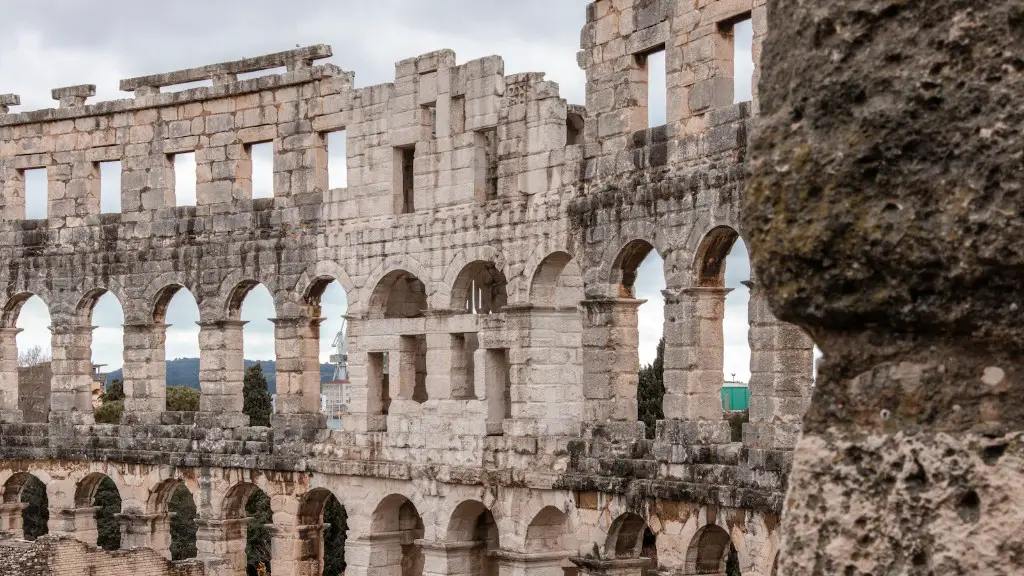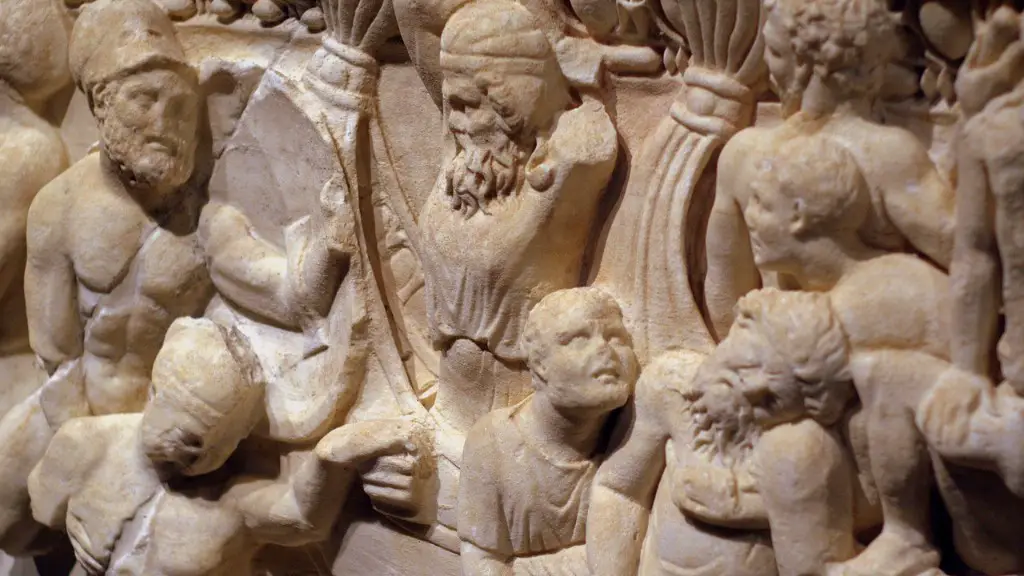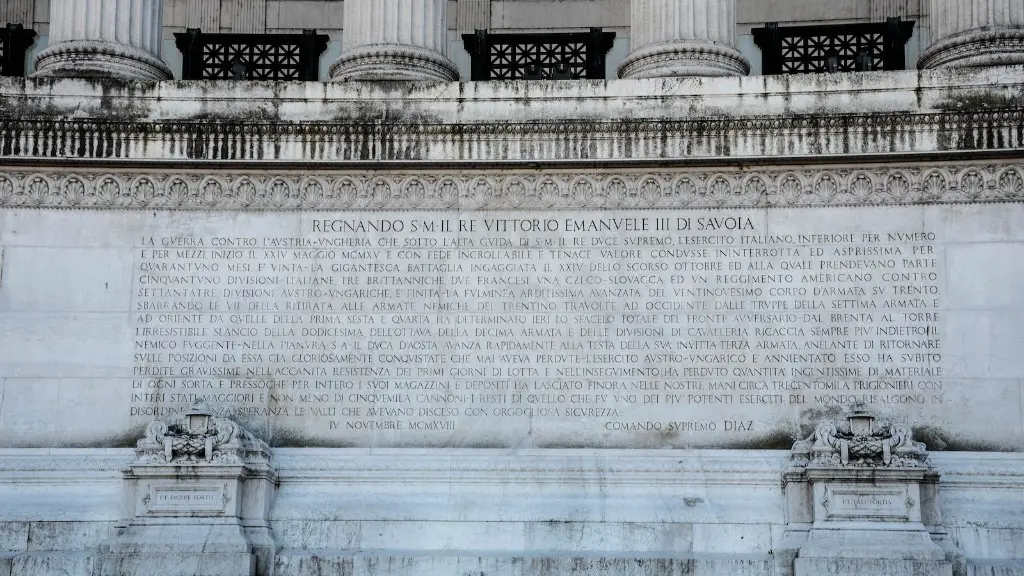In the ancient Roman Empire, farming played a significant role. This was due to the fact that the main food source of the people was from the farming activities and it allowed the Empire to prosper. Additionally, it was considered a respected profession since it was a way for people to sustain themselves and their family. Though we often overlook the importance of traditional farming in the Roman Empire, it manifests in the form of sustainable practices and it enabled them to thrive in the harsh climate.
Archaeological evidence suggests that many of the farming techniques used during the Roman period were originated in Spain. As such, it is believed that these methods were spread by the Phoenicians and other Mediterranean civilizations. In most cases, these methods allowed Romans to cultivate on uncultivated lands and increase the yields of their crops. Moreover, the use of terracing and hydraulic engineering created an efficient and practical agricultural system.
In terms of crop variety, the Romans farmed a range of different crops. This included grain harvests, legumes, vegetables, fruits, olives, and vines. While crops such as wheat and barley were mostly used for bread-making, some fruits and vegetables were meant for medical purposes. Furthermore, the importance of cattle and other livestock was apparent since the Romans relied on their produce for other food sources such as milk and cheese.
The agricultural system of the Roman Empire was sophisticated and evident in their infrastructure. For one, canals, dams, terracing, and villas were essential to the system. Canals allowed rivers to be diverted so that water could be directed to different areas. Meanwhile, terracing took advantage of gravity by creating embankments that redirected water into furrows so crops could easily be watered. Villas also created convenience, as they allowed people to live closer to their agricultural lands, thus providing a source of labor.
Although there were numerous farming techniques employed by the Roman Empire, the most remarkable among them was the use of manuring. This practice enabled the Romans to keep the soil nutrients at an optimal level all throughout the season. Additionally, animal bones and dung enriched the soil and helped them cultivate even on the poorest of lands. This enabled the Roman empire to sustain itself and even expand its territories.
Despite the evident sophistication of the agricultural system in Rome, there is evidence that it doesn’t always result in success. Poor weather conditions, a lack of resources, and political turbulence could have caused great losses in productivity. In fact, many scholars have argued that some of the great famines in Rome were due to a lack of resources and a decrease in yields.
Today, ancient Roman farming practices still remain relevant. With the threat of climate change, there is a resurgent interest in sustainable methods of agriculture and the Romans can provide insight into this field. Additionally, the skills acquired from these methods can help create essential jobs in impoverished areas and provide food security for those in need. In a sense, medieval production techniques, such as those practiced in the Roman Empire, can still provide solutions to modern problems.
Economic Impact in Ancient Rome
Farming was an essential industry in Ancient Rome and shaped the economy in countless ways. It provided sustenance and nourishment to the citizens of the vast empire, which in turn helped Rome reach its wealth and power. Giving credit to the robust agricultural system, the empire managed to support its large population, successful military campaigns, and vast commercial trading and commerce networks.
Agricultural activity was the primary source of income for Romans during this time. The farmers represented the working-class of the Roman society, while the landowners had a greater influence on the state of the empire. The produciton of basic foodstuffs such as cereals and grains often involved great labour. This was done mainly by the peasantry and servile classes, and some by the lower classes of the Roman middle class.
At the same time, landowners prospered through their estates. Since the products were distributed in the major cities, the owners would receive a hefty income from the sale of their produce. This enabled them to gain more political power, a privilege only few could attain at the time. From slave labour, to surplus income and resources, farming helped landowners gain considerable wealth and increased their dominance over the Roman economy.
Farms were also used for trading purposes and helped the spread of Roman doctrine. Businesses would prevail in the rural countryside, and traders often exchanged goods over long distances. This enabled the Empire to export products such as wine and olives to far away countries, generating trade and revenue for both the farmers and merchants.
So, while farming may not be something we think of when discussing the Roman Empire’s success, it is undeniable that it had a major role in helping them to flourish and remain successful.
Political Ramifications
As mentioned, the farms were mostly under the influence of the Roman landowners. This was important since it allowed them to maintain domination over their rural estates. This type of control took place under the Roman legal system, and thus the landowners had authority to administer justice and pass judgement for any particular misdemeanours.
Additionally, the lawmakers of the Empire were able to use the farming system to their advantage. Principally, taxes were imposed on both the peasantry and landowners, as a form of financial support for the Roman army and campaigns. In this sense, it is clear that farming helped the state to maintain its stability and protection.
In the case of tax exemptions, it is known that some farming activities were allowed to be exempted from taxation. This was due to religious laws and arguments, as well as the admiration the Romans had for their own agricultural successes. Thus, it can be argued that farming helped to legitimize their religious and political agenda.
Social Commentaries
Farming also provided significant religious and social advantages. Rural life in the Roman period was intertwined with the gods, as some farmers paid tribute to gods while securing their income. This was especially the case in areas that lacked sufficient resources, where the farmers often sought to divine favors through offerings and rituals.
Additionally, farming activities were linked to the daily life of the Roman people, who depended heavily on the main food sources that were produced. Not only did this guarantee sustenance, but it also supplied them with a sense of security and continuity. As a matter of fact, the Roman gods often symbolized agricultural successes and were rewarded during festivals involving grain and wine.
Ethical Ramifications
Roman farming also provided socioeconomic benefits, and it often reflected their cultural values and ethics. Slave labor was common in the production of goods, as slaves had to follow instructions from their masters and did not have much choice. At the same time, this type of work was not solely exploitative, as some slaves had their own relationships with the land and found religious comfort in the agricultural activity.
In the same vein, historians have argued that many of the Roman methods were surprisingly modern and progressive. For instance, the use of manuring and crop rotation enabled them to increase the harvests for their food sources, while taking advantage of their limited resources. Yet, although their methods were advanced, evidence suggests that the Roman Empire still suffered from agricultural failures due to alarming weather conditions and other factors.
Legacy
In conclusion, the Roman farming system not only provided sustenance and development to the empire, but also helped to shape its legacy. Many of the methods and practices used during this time are still in use to this day, and can be found in various parts of the world. Moreover, it is undeniable that the emperors who pushed forward this system helped to create an economic system that continues to be used in some form today, providing an impressive connection between the past and present.





